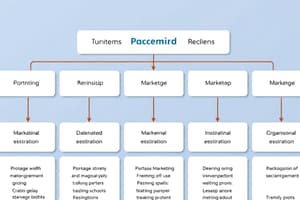Podcast
Questions and Answers
Which subprocess is NOT part of the overall sales process?
Which subprocess is NOT part of the overall sales process?
- Negotiation
- Closing the deal
- Product delivery (correct)
- Lead qualification
What is the primary goal of marketing in a business process?
What is the primary goal of marketing in a business process?
- Increasing sales
- Managing customer complaints
- Facilitating product delivery
- Building brand trust and loyalty (correct)
Which of the following best describes the customer service process?
Which of the following best describes the customer service process?
- Conducting market analysis
- Providing support to maintain customer relationships (correct)
- Dealing with customer purchases only
- Generating new leads for future sales
Which process is specifically related to maintaining compliance with regulations?
Which process is specifically related to maintaining compliance with regulations?
How can a well-thought-out delivery process benefit a business?
How can a well-thought-out delivery process benefit a business?
Which subprocess directly follows lead generation in the sales process?
Which subprocess directly follows lead generation in the sales process?
Which of the following options is crucial for service-based companies?
Which of the following options is crucial for service-based companies?
What role do subprocesses play in the sales process?
What role do subprocesses play in the sales process?
What is the primary responsibility of the Operations function in a business?
What is the primary responsibility of the Operations function in a business?
Which function is responsible for strategic talent management in a company?
Which function is responsible for strategic talent management in a company?
What is the ultimate goal of the Marketing and Sales functions?
What is the ultimate goal of the Marketing and Sales functions?
How do functional areas within a business operate?
How do functional areas within a business operate?
What does the Finance and Accounting function primarily manage?
What does the Finance and Accounting function primarily manage?
What differentiates Sales activities from Marketing activities?
What differentiates Sales activities from Marketing activities?
What is a key role of marketing personnel in a business?
What is a key role of marketing personnel in a business?
What is the function of an information system in a business?
What is the function of an information system in a business?
What is a significant advantage of using tier 2 ERP solutions?
What is a significant advantage of using tier 2 ERP solutions?
Which of the following is a disadvantage of tier 2 ERP systems?
Which of the following is a disadvantage of tier 2 ERP systems?
What is a defining characteristic of tier 3 ERP solutions?
What is a defining characteristic of tier 3 ERP solutions?
Which tier of ERP solutions would likely be the fastest to implement?
Which tier of ERP solutions would likely be the fastest to implement?
What is a common issue with tier 3 ERP solutions in terms of functionality?
What is a common issue with tier 3 ERP solutions in terms of functionality?
Which of the following ERP solutions is an example of a tier 2 system?
Which of the following ERP solutions is an example of a tier 2 system?
What is a notable feature of tier 3 ERP systems regarding technical expertise?
What is a notable feature of tier 3 ERP systems regarding technical expertise?
One disadvantage of tier 3 ERP solutions is that they often lack what compared to tier 1 or 2 systems?
One disadvantage of tier 3 ERP solutions is that they often lack what compared to tier 1 or 2 systems?
What is the primary function of the procurement module in ERP software?
What is the primary function of the procurement module in ERP software?
What does the manufacturing module assist with?
What does the manufacturing module assist with?
How does the order management module contribute to customer satisfaction?
How does the order management module contribute to customer satisfaction?
What is one key benefit of the inventory management module?
What is one key benefit of the inventory management module?
What is the role of the warehouse management module?
What is the role of the warehouse management module?
What aspect of the supply chain does the supply chain management module address?
What aspect of the supply chain does the supply chain management module address?
How does the customer relationship management (CRM) module benefit manufacturers?
How does the customer relationship management (CRM) module benefit manufacturers?
What is a feature of advanced order management applications?
What is a feature of advanced order management applications?
What is the primary focus of supply chain management?
What is the primary focus of supply chain management?
Which of the following best describes the primary goal of human resources?
Which of the following best describes the primary goal of human resources?
How does marketing primarily differ from finance?
How does marketing primarily differ from finance?
Which function is NOT typically included in operations management?
Which function is NOT typically included in operations management?
What is a key activity encompassed by marketing?
What is a key activity encompassed by marketing?
Which of the following is a significant emphasis of operations management?
Which of the following is a significant emphasis of operations management?
What contributes to the operational focus of supply chain management?
What contributes to the operational focus of supply chain management?
What is a primary function of accounting and finance in a business?
What is a primary function of accounting and finance in a business?
Study Notes
Core Business Functions
- Operations (Production): Responsible for transforming raw materials and resources into tangible goods or delivering intangible services.
- Human Resources (HR): Manages talent by attracting, recruiting, training, and developing employees to achieve company objectives.
- Marketing: Understands customer needs and demands, promoting company offerings, and generating sales through targeted strategies and communication.
- Finance and Accounting: Manages the organization's financial health by strategically allocating resources, monitoring cash flow, and ensuring financial compliance.
Importance of Business Functions
- Interdependent functional areas.
- Each functional area requires data from others.
- Better integration improves communication, workflow, and company success.
- Information systems (IS) - Computers, people, procedures, and software that store, organize, and deliver information.
Marketing and Sales
- Two key roles: attracting and developing customers to increase revenue.
- Sales: Convincing a prospect to buy a product or service through communication.
- Marketing: Strategies and processes to generate prospects and customers, promoting products and features, acting as guides for customers.
Supply Chain Management (SCM)
- Manages the flow of goods, data, and finances from raw materials to final delivery.
Accounting and Finance
- Recording and analyzing business activities to understand cash flow and make better decisions.
Human Resources
- Responsible for finding, recruiting, screening, training job applicants, and managing employee benefits.
- Supports employee recruitment, retention, engagement, and overall productivity.
Marketing Business Function
- Market Research: Gathering and analyzing data about consumer needs and market trends.
- Brand Management: Creating and maintaining a strong brand identity.
- Advertising and Promotion: Designing and executing campaigns to generate interest in products/services.
- Sales: Direct interaction with customers to close deals.
- Customer Relationship Management (CRM): Managing interactions with current and potential customers.
Operations Business Function
- Production Management: Overseeing the manufacturing of products or delivery of services.
- Supply Chain Management: Managing the flow of goods, services, and information across the supply chain.
- Quality Control: Ensuring products/services meet certain standards of quality.
- Inventory Management: Tracking and managing levels of raw materials, work-in-progress, and finished goods.
- Process Improvement: Identifying and implementing ways to enhance operational efficiency.
Sales Processes
- Sales Process: Discovering leads and converting them into loyal customers.
- Lead Generation: Identifying potential customers.
- Lead Qualification: Assessing the suitability of leads.
- Contacting Leads: Reaching out to prospective customers.
- Negotiation: Reaching an agreement on terms.
- Closing the Deal: Finalizing a sale.
- Nurturing Current Customers: Building and maintaining relationships with existing customers.
Marketing Processes
- Building trust and loyalty in the brand.
- Utilizing various advertising channels like social media, search engines, and physical ads.
Customer Service Processes
- Providing excellent service to encourage repeat business.
- Addressing customer problems, developing solutions, and ensuring satisfaction.
Supporting Processes
- Accounting: Managing assets and debts to maintain solvency and comply with regulations.
Enterprise Resource Planning (ERP) Systems
- Tier 1 ERP Systems: Highly complex and customizable systems suitable for large, multinational organizations.
- Tier 2 ERP Systems: Premade software, low-risk implementation, often cloud-based, modular, and configurable for rapidly growing organizations.
- Tier 3 ERP Systems: Cheapest and easiest to implement, suitable for niche markets or smaller businesses.
Examples of ERP Systems
- Tier 1: SAP, Oracle
- Tier 2: NetSuite, SAGE, Epicor
- Tier 3: QuickBooks, Odoo
Procurement Module
- Automates requests for quotes, tracks and analyzes quotes, prepares purchase orders, tracks orders, and updates inventory levels.
Manufacturing Module
- Simplifies complex manufacturing processes, ensures production aligns with demand.
- Includes functionality for Material Requirements Planning (MRP), production scheduling, manufacturing execution, and quality management.
Order Management Module
- Tracks orders from receipt to delivery.
- Manages the status of orders being prepared, fulfilled, and shipped.
- Prevents orders from being lost and boosts on-time delivery rates.
Inventory Management Module
- Provides real-time inventory information to manage finance, planning, logistics, and operations.
Warehouse Management Module
- Manages high-volume warehouse operations, guiding employees through the processes of put away, picking, packing, and shipping.
Supply Chain Management Module
- Tracks every step in the supply chain process.
- Ensures the availability of the right inventory, in the right place, at the right time.
Customer Relationship Management (CRM) Module
- Manages the customer lifecycle from initial contact to sales, production, and post-sale services.
Studying That Suits You
Use AI to generate personalized quizzes and flashcards to suit your learning preferences.
Related Documents
Description
This quiz explores the core functions essential to any business, including operations, human resources, marketing, and finance. Understand how these interdependent areas contribute to overall company success and the role of information systems in enhancing communication and workflow. Test your knowledge on how these functions operate together to drive business performance.




